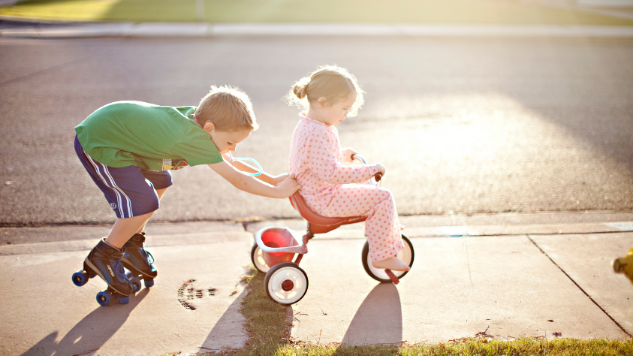How to Stop Siblings Fighting

Why can’t they just get along?! One of the greatest joys of parenthood is watching moments of togetherness between siblings. The love can warm the heart like nothing else. However, it can also be snatched away with alarming speed. Siblings can go from best buddies to arch enemies in the blink of an eye. You can quickly find yourself needing the skills of both a world-class referee and a UN negotiator. Is sibling fighting just par for the course of parenting? Is there a way you can stop it?

Get a Head Start
Without really realising it, you have immense power in the sibling relationship. Yes, nature means that you’re only really rounding out the edges of different personalities, but nurture counts here. Before a new sibling comes along you can get a head start and lay the groundwork for the new relationship. Engage with the older child about the new arrival in an age-appropriate way. However, take great care to do this within the context of how much you have loved their babyhood. Explain to them what made you smile about their birth, their arrival, and their early days.
Top Tip: Buy a gift from the new baby for the older sibling to start things off on the right track.

Let Them Know They Are in It Together
It’s very easy to type-cast siblings. The older one is meant to be more responsible, look out for their little brother or sister, and generally gets cut less slack. The younger one may feel frustrated that they cannot do what the older one can. They constantly come second (or third, or fourth…). As parents you need to take steps to let the siblings know that they are very much in the same boat together. They are the children, you are the parents. If you put the eldest in a position of responsibility you can’t blame them when they think they can boss the little one around.
Top Tip: Encourage your children to be on each other’s side – even if that sometimes means they are united against you. Nothing unites quite like a common enemy after all!

Equal but Different
Despite being a unit, as described above, all children are individuals. Therefore it’s important to start teaching them from the very beginning that “equal and fair” doesn’t necessarily mean being treated the same way. Each child should be treated fairly and as an individual. If children feel something is unfair – hear them. Then, explain why there is a difference in treatment. Perhaps they got a new bike when they were the same age? Perhaps they will be allowed a later bedtime when they aren’t so tired in the mornings?
Top Tip: If a child wails “It’s unfair!” - hear them! Acknowledge that they feel that way but take the time to explain why treating them fairly may mean treating them differently.

Give Them Time
Children need time. They are also, by nature, egocentric. Therefore, one of the greatest gifts you can give them, in terms of their relationship with each other, is to give them regular undivided one-on-one time. Whilst modern life can make this tricky to instigate, it’s extremely important. In this time together, give yourself fully to that child’s needs. Guard that time from infringement by others and let them know that, for that window, they are the centre of attention.
Top Tip: Even not-so-perfect attention is better than no attention, so take the bull by the horns and give them the good stuff.

Step In, or Step Out
There may come times when sibling rivalry becomes sibling fighting. This can be particularly difficult for parents, because within us rises up the Mama Bear who doesn’t want anyone hurting their cub. But what if the one that’s doing the hurting is your cub too?
If punches are being thrown it’s time to step in and call timeout. Take care not to take sides, but simply enable some space. Even if you think there’s a clear-cut perpetrator you won’t necessarily have seen the build-up, or heard unkind words hurled, before the dramatics started. Therefore, focus on separation and space.
Top Tip: When you step in, don’t take sides, create space.

Listening 1, 2, 3
Children need to feel heard – especially when they feel aggrieved. Sibling fighting and disagreements are a perfect training ground for helping them develop emotional intelligence. Rather than enabling and encouraging the slanging match, encourage the children to explain what they feel. For example, rather than allowing “I hate him, he broke my favourite toy”, reframe it to “I feel sad and angry, I loved that toy and now it’s broken”. When children learn to describe how they feel – perhaps sad, angry, disappointed, frustrated, or left out – it encourages empathy and understanding from the other child. Discussion can then move to resolution.
Top Tip: Encourage “I feel…” statements. Reinforce you’ve heard by repeating back “You feel…”

Make Them the Problem-Solvers
If you see a sibling issue brewing, it’s tempting to step in with your adult-approach and solve the problem before it gets off the ground. However, you’re missing a trick here and robbing the siblings of a vital learning opportunity. Instead, let the children know you’re aware of the fight brewing. Tell them that you know they are great problem-solvers and you’ll be back in three minutes to hear their solution (perhaps temporarily removing a toy if it’s at the centre of the spat). This puts the onus on them to solve their problems. When you return hear out their solution. Check both sides are happy. Then praise them for their approach.
Top Tip: Within a safe framework, let the children solve some of their own disputes.

Celebrate the Differences, Without Typecasting
It’s natural to draw comparisons between your children. But keep these to yourself. Celebrate what each individual does, but take care not to label them. If you label children (for example, ‘the bright one’ or ‘the sporty one’) you can actually limit their potential and also that of their sibling who feels like they cannot compete, and are ‘no good’ in that area.
Top Tip: Never start a sentence with “Why can’t you do X like your brother…”

Praise Success
As with other areas of parenting, success in sibling relationships should be praised. Reinforce good and kind sibling behaviour with sibling treats and rewards. For younger children this may mean having a ‘sibling sticker chart’ where they are working towards a goal together. For older ones perhaps they can be rewarded with a special treat such as going to see a film together.
Top Tip: Praise positive sibling behaviour wherever you can.
If you can prevent siblings fighting through implementing the steps above, then you’re giving your children an immense gift. Siblings are forever, and they can be great friends for life – but they may need some help building the right foundations.
